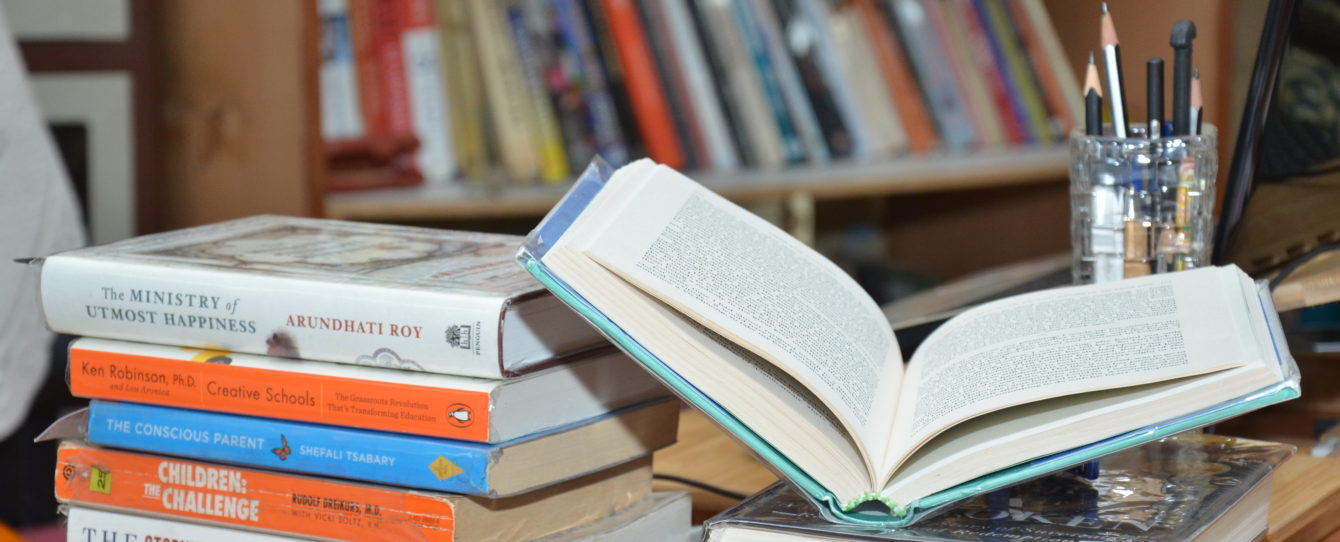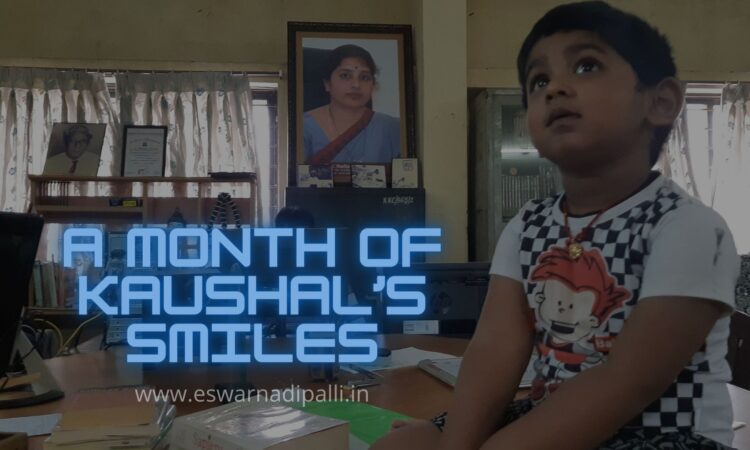(One thing that comes closer, a comfort, which can heal the pains at these pandemic times in every perfect way: it’s about the magical bonding with grandchildren. For me, it’s my three-year-old grandson, Kaushal.)
He trots around, sings, laughs, and smiles and is always busy working out something with endless chatter. When he’s tired of himself, he peeps into my reading. I watch him: slowly slips his head through the door, deals a push as much as his tiny hands can muster and sneaks in, tossing a loud giggle, and quickly sizes up whether I noticed his intrusion. I pretend I’m busy. Honestly, I admit whatever irritation gets prompted to show by way of petty annoyance, it halts midway. I’m disarmed. I at once decide, “Let me see nothing else matters, spending time with him is more preciously important,” I switch off my adult responsibilities, shift to a favorable lower gear to join his world of play and mischief.
Kaushal safely spent the first three months of lockdown at his maternal grandparent’s home when the pandemic crisis peaked at an alarming level. A month ago, a brief respite in the vehicular movement allowed my son to drive him down along with his mother. Since then, a blend of laughter and mischief brightened every room he entered. He jumps, scurries under the tables, bed posts, whatever he felt fit to climb and jump. Soon I concluded, “It’s hard to shut him up.”
Kaushal is a sweet, gentle boy with tireless mobility where his mouth and legs compete to outperform each other – a word picture that very well describes him. His legs never stop to toddle, and his mouth never ceases to babble – lips like tiny lily petals seem too busy and merry all the time. I find it hard to make out how fast his mini – mind has to function, to churn out the nonsensical riot he speaks to himself.
His face is round, radiant, a feature that resembles my mother, and his eyes need a special mention. I have never seen a toddler’s eyes capable of so many amusing expressions. I don’t know how he has trained himself at the age of three. Kaushal uses his eyes in a startling number of ways. After a months’ scrutiny, I sensed his eyes are his main channel of communication. Something the way spiritual gurus’ do! A silly comparison: I laugh at myself. He is smart and sensitive to an equal degree and uses the flicker of eyes to convey a gamut of moods. Expresses fond closeness, anger, a mischievous squint, drooped when sulking, lucid with a book in his lap, dancing in a drive out with his parents. His eyes are his emotional display lights. I can see through them when he blinks, the soft-looking manner he does it. It amazes me how he brings the nuanced feelings together to form an intense starey glare in his eyes.
I have had a remarkable inheritance from my father that I proudly behold; it’s the love for reading. The habit saw me more educated, gifted a depth of understanding of reality than any real-life experiences could ever teach. For Kaushal, I have never pampered him buying expensive gifts. Instead, I made children’s books his toys. It’s gratifying to find him hunched over the beautifully illustrated books. Kneeling on the bed, all glossy, colorful books scattered around him; bent intently gazing, eyes dancing on each picture, the vehicles, the birds, the animals, the words in the rhymes. I watch him tucked in some indistinct mutter, oblivious to the sounds close by, soft fingers feeling the pictures, almost in a trance, floating himself in a tiny world of his colorful library.
He loves the daily outings in his father’s car, which he shouts as ‘Nana’s car’ as he runs toward it, rushing for the front seat in the most rambunctious manner. Once inside, he sets out a situation to be observed; if defied, he wouldn’t allow the drive smooth and relaxing. The group either must stay put inside the vehicle or step out collectively. If anyone selects to get off, say for an errand, he suddenly becomes upset and breaks into a loud kicking that even his mother feels helpless to soothe with assuring words. As long as the person doesn’t reappear, he doesn’t budge from his crying pitch, and the calmness restored when the person returns. In between, I tolerably stare at the helplessly embarrassed parents and inconsolable Kaushal, wondering at the strange sobbing courteousness displayed by him.
There I found an activity Kaushal I have been enjoying that has developed into a game and, for me, a melancholic reminder. The way he demands to go around in the wheelchair, converting it as a stroller. It’s the wheelchair that carried my wife for three long years, and it remained a testimony of sentimental anguish. After her departure, she had fought a prolonged battle with cancer; the wheelchair symbolized a soft call of conscience for my two grownup children and me.
When he is in a mood for a ride, he pulls me along out of my study to the wheelchair stowed somewhere in the corridor. After having climbed with his tiny movements onto the chair, I receive a hand gesture – a signal to push along.
I wouldn’t mind closing shut a book or pause a few minutes from wracking writing deadlines: struggling to stitch together the memories dug from the past before they tap themselves on the keyboard. I walk the wheelchair along the long corridor; Kaushal adjusted in the leather seat, speaking slowly to himself in small words, rhymes, or something I don’t get them. But I walk slowing pushing my delightful little grandson. I gather after a while that these small acts pass on good vibrations to calm my inner temperaments. I started seeing them as little shelters for our inner storms. They are cleansing smiles of hope. In that cushy mood, I wonder these little happiness toddlers aren’t they the healers for the rest of our lives. I say it to myself, deep down, “sure, they are.”
He seems to run over all the place with an energy fit for an elephant, asking him to sit still is like instructing water not to flow. Kaushal’s bouncy strides become more bursting, high spirits ballooning as the night deepens. He walks into my bedroom, gets into a hasty rearrangement for play protocol. If he finds me reclined against the cushions with a book in hand, he gently removes the book from my grip, shoves it aside, and pulls my both feet straight that I lay sprawling to watch him stomping in circles on bed waving his hands squealing at his shadows on the wall. I notice fluent ease as his smallish mouth parrots breathlessly the rhymes and words that his mother has taught him. I keep smiling at his innocent merrymaking, ignoring for a while my stifling yawns, dropping weary eyes.
I have played significant roles in four decades of adult life: a parent and a teacher, a friend, and the grandfather wherein the responsibilities have created many opportunities to interact and teach children: of all age groups. Never have I experienced any annoying contests with any of the different groups. Often it’s because I follow an emotional thumb rule – I would most of the time mentally align myself to their requirements by giving children a signal, “your feelings in whichever way you show, I’m happy with it.”
Guided by the psychological tenets and philosophy of Dr.Haim Ginott’s in his books on children, I have gained a few universal insights – about timely adjustments, minimal sacrifices. I have learned a way to enjoy children, tolerate them, sail with them, converse with them, not to be cross at them. It never ruffles me but allowed to get along gracefully, relaxed at the innumerable mischief they attempt despite my unruffled attitude.
I narrate them as brief statements:
A child’s feelings and demands must be taken seriously.
Children’s needs are far more important than our priorities.
When children ask anything, whatever at hand has to be kept aside and remember never postpone the time allotted to spend with them?
The sympathy we give for children is like an emotional Band-Aid.
More than love, children need us to respect them as individuals at any age.
Children don’t expect gifts from parents; they long to spend time in a parent’s presence.
Abusive language, like poisonous arrows, is to be used against enemies, not against little children.

